Trending Assets
Top investors this month
Trending Assets
Top investors this month
Preliminary thoughts on buying the dip on Chinese equities
Despite all the geopolitical issues surrounding China and Taiwan, a couple Chinese stocks have managed to perform well since the pandemic. Here are a few examples:
Luckin Coffee $LKNCY (the infamous "Starbucks of China" wannabe)
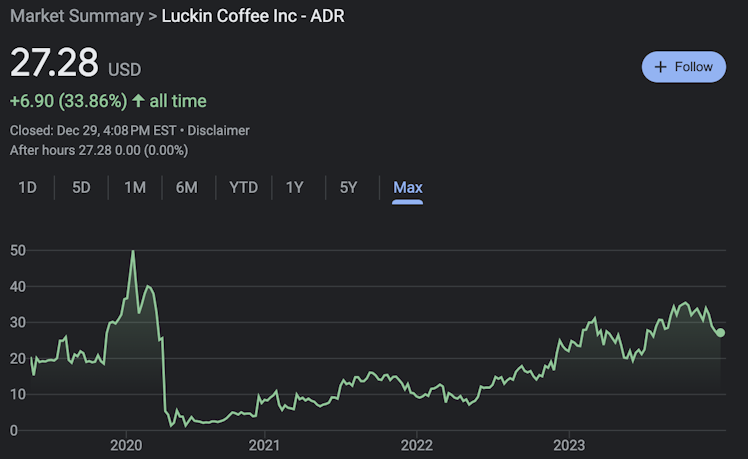
Pinduoduo $PDD, the owner of Temu
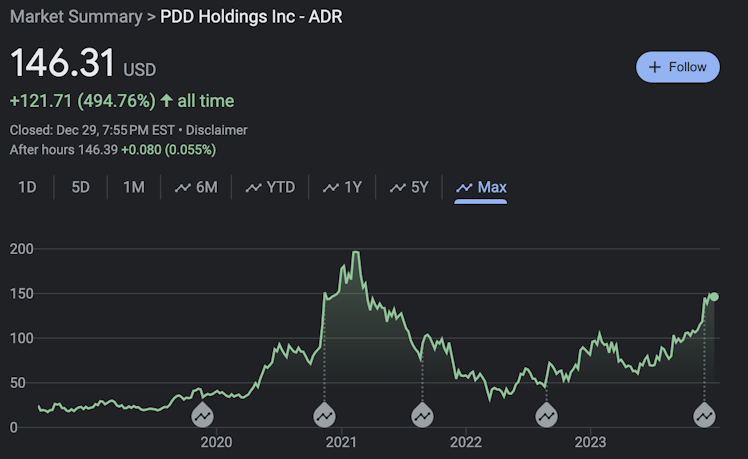
New Oriental $EDU
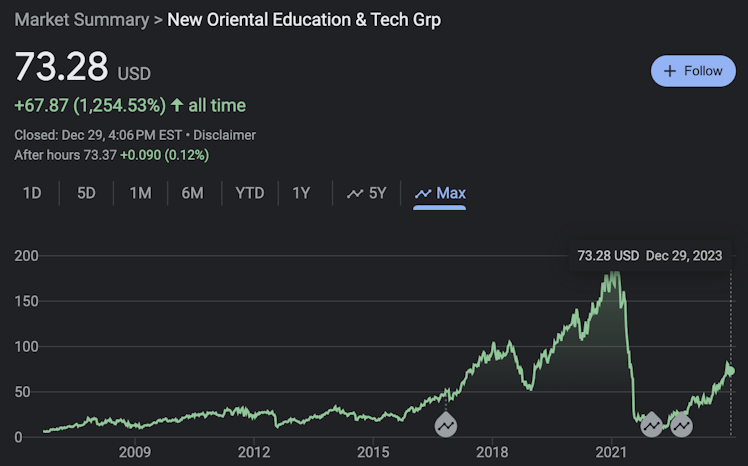
Meanwhile, you have the China large-cap ETF $FXI hitting its main support area since IPO. $BABA and $BIDU, the two big Chinese tech giants, are seeing themselves in similar territory.
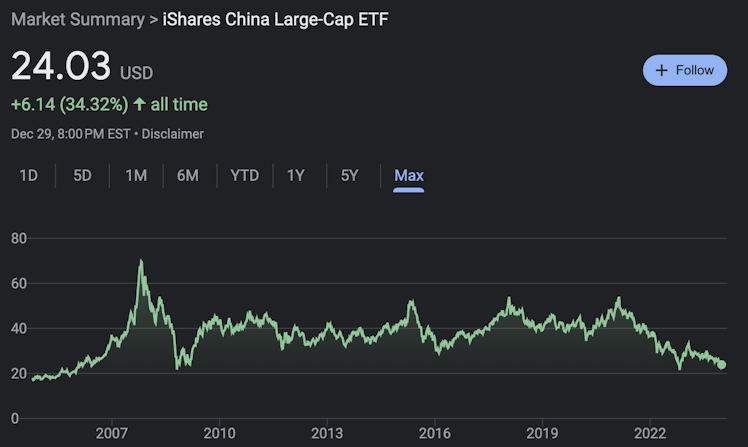
There is so much fear surrounding Chinese equities. I hold so much fear in them and have written memos about China that has stoked more fear into Chinese equities. The COVID-19 pandemic was what popped the China bubble. The movie Crazy Rich Asians was what marked the top of the China bubble. But Chinese equities look so cheap and China continues to be vital to the global economy. The success of Temu and SHIEN along with the rapid growth of China's auto industry in the post-pandemic era has brought my attention back to China as the country continues to find new ways to grow. Though Hong Kong is no longer the big economic centre it once was because of the CCP takeover of the city in 2019, Singapore has become the new channel for Chinese companies to skirt the US chips and biotech sanctions on Chinese companies and get the latest semiconductors and biotech innovations.
The real estate crisis we are seeing in China is not a surprise. For decades, the CCP has done everything it could to delay an inevitable real estate collapse and now, it's finding itself unable to stop this real estate recession. What America experienced in 2008 with real estate, China is seeing worse in 2023. Like the Great Recession, in China's real estate crisis, tech companies continue to grow and start becoming a bigger contributor to the economy. It will take time for China's real estate sector to downsize significantly as larger excesses in the economy take longer to get rooted out.
Outside of tech and real estate, China continues to see gains in its green energy industries as the country produces 75% of the world's batteries, 83% of offshore windmill blades, 96% of wafers used in solar panels, and has 89% of the world's rare earth metals refining capacity. China holds more control over the green energy supply chain than what I've described here.
Addressing the CCP issue
The CCP has influence over how its private industry operates on a level that Americans can't comprehend. This can often be to a company’s detriment, on the micro level. If a business isn’t complying with the CCP’s ever-evolving guidelines, the punishment is swift and severe. Companies are made examples of in China. One of those companies is Evergrande, who couldn't comply with the "Three Red Lines" laws and later went bankrupt as a result. If you think about it, if the government introduced rules that outright destroyed one of its biggest businesses, Americans would say the law was a gross overstep of government power. But in China, it’s just a way of dealing with bad behavior before it becomes normalized. We can all learn that just because it does things differently does not mean the country is un-investable. The actions that the CCP has done in the private sector can be seen as the government actively sabotaging its private sector or as intervening early on contagions it sees spreading throughout its markets. Despite government intervention, many of these Chinese tech giants are growing and thriving.
Broader Picture
The re-shoring and near-shoring boom that has started since the COVID-19 pandemic has given people the false impression that Chinese companies are losing power on the global stage. This is false as many of the factories that are being moved out of China to Mexico and other countries are done by Chinese companies. As for many other Chinese factories, they're moving their factories out of the expensive coastal cities and are moving inland instead. As this article notes, "[a] significant portion of near-shoring activity is being generated by Chinese-owned multinational manufacturers...another group of Chinese-owned companies that are less sophisticated in their approach to global trade are importing products from China, stamping them 'Made in Mexico,' and hoping for tariff-free treatment by U.S. Customs." Furthermore, this move of moving factories out of China helps China transition away from industries that are labor intensive and allocate more of their resources towards industries higher in the value chain, allowing it to escape the middle-income trap and become a high-income country.

As energy remains a hot topic in the world as geopolitical tensions in the Middle East give rise to fears of a 1970s-style energy crisis, China won't have to worry about securing sufficient energy for its economy as it has close relations with Russia and Iran. With Russia, China can import energy by land or ship in the Pacific. With Iran, any oil tankers headed to China won't be attacked by the Iranian military or its proxies (i.e. Houthis) in the Red Sea and Persian Gulf. Only the West has to worry about sourcing energy from the Middle East because Iran and its proxies are only making it difficult for them to get oil out of the region. Interestingly enough, the WSJ noted that around 20% of global oil this year was bought and sold in other currencies as Russia and Iran sold cargoes to China and other buyers.
While the media paints the real estate crisis as something that is making the average Chinese household poorer, it's important to note that:
- 90% of households own their own home (source)
- 80% of the homes that households own are owned outright (no mortgage, no leans) (source)
- more than 20% of urban households own more than one home (source)
- there is no student loan issue among Chinese households (source)
Keep in mind that property purchases in China don't consist of individuals going out and buying homes on their own. In reality, it's entire familial and friend networks who financially assist each other in the purchase of a property. As an economic crisis unfolds in China, households will able to weather the crisis better because they stick together and aren't over-leveraged like the developers.
Altogether, with all the events unfolding globally, China is in better position than the perspective that the media puts it.
Conclusion
The fears that investors have over the possibility of China invading Taiwan has not stopped stocks like Luckin Coffee, PDD Holdings, or New Oriental from rebounding and performing well for 2023. As many strong and growing Chinese tech giants have seen their valuations get compressed due to these fears, the risk-reward opportunity for Chinese equities looks favorable for investors in 2024. Understanding the reasons for the CCP's intervention in the private sector and the broader picture of how global trends promote China's economic and political power on the global stage further supports the bull case for Chinese equities.
I'm still debating on whether to take a tiny position on Chinese equities to ride their rebound or not. The hawkish behaviors of the PLA around the Pacific as Taiwan's presidential elections near are giving me a sense that China will invade the island either in April or October of 2024. With the West dealing with critical ammo shortages as they continue supporting Ukraine and Israel, the window of opportunity for China to successfully invade Taiwan widens. No one is sure whether China will continue to sit back and let Russia and Iranian-proxies continue their military campaigns to drain the West's ammunition supplies further or if they will invade while the opportunity remains hot. The destruction of Taiwan will put over 90% of advanced semiconductor production and over 60% of global semiconductor production capacity offline, worsening the West's issue of being able to build the weapons needed to support its allies.
It may be wise to avoid jumping in on the possible rebound of Chinese equities in 2024.
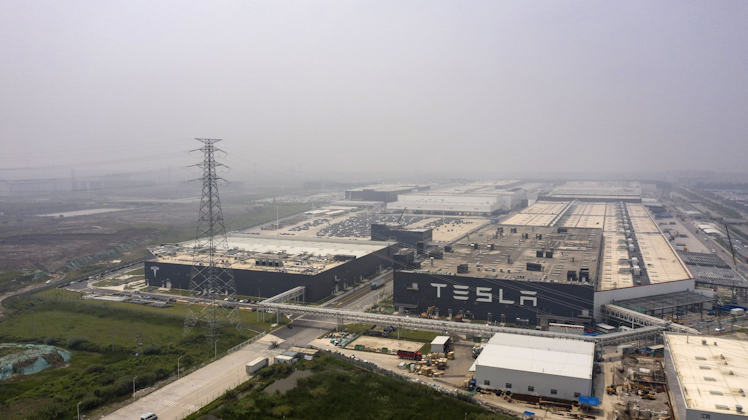
Tesla Gigafactory Shanghai
CNN
US eyes weapons stockpiles as concern grows about supporting both Ukraine and Israel’s wars | CNN Politics
Concern is growing within the Pentagon over the potential need to stretch its increasingly scarce ammunition stockpiles to support Ukraine and Israel in two separate wars, according to multiple US defense officials.
Already have an account?